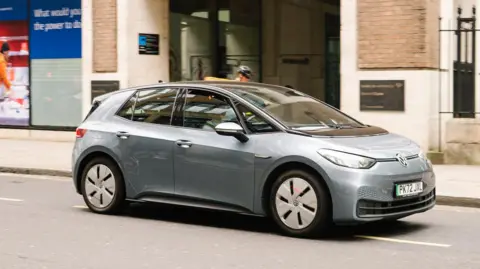Volkswagen (VW), the prestigious German automaker, has launched a groundbreaking subscription service for UK customers that aims to enhance the performance of certain electric vehicles within its ID.3 lineup. With an ever-evolving automotive landscape, this innovative feature allows drivers to increase their car’s power for a monthly fee, effectively redefining consumer control over vehicle capabilities.
Upon acquiring an eligible ID.3 model, customers are presented with an option to pay an additional fee to unlock the full power potential of the engine residing within their vehicle. This optional power upgrade is priced at £16.50 per month, or alternatively, customers can opt for an annual fee of £165. There is also a lifetime subscription option available for a one-time payment of £649. This recent development aligns with VW’s goal to provide customers with more choices and flexibility regarding vehicle performance.
The feature has been introduced amid a shifting paradigm in the automotive industry, where subscription models have begun to gain traction. A spokesperson for VW noted that empowering consumers with the ability to selectively enhance their vehicle’s performance is not entirely new; a practice for many years has been observed in the realm of petrol and diesel vehicles. They explained that it has traditionally been common for manufacturers to offer various engine options for a single vehicle platform, allowing buyers to select between standard and higher-performance versions based on their preferences.
Moreover, VW emphasizes that the power upgrades afford drivers a sportier experience whenever they desire it, without burdening them with the higher initial costs typically associated with more powerful vehicle variants. The subscription model provides a unique avenue for those who may want to experience enhanced performance temporarily or for specific occasions without the commitment of paying upfront for a higher-specification vehicle.
However, the introduction of subscription-based options in vehicles has not been without controversy. Mixed reactions from customers include concerns over the necessity of paying for features that may already exist within their cars, raising questions about fairness and transparency in vehicle pricing. This has ignited discussions within the automotive community about the ongoing trend of separating vehicle features into paid tiers, leading to dissatisfaction among consumers.
Other manufacturers have also explored similar subscription services in their offerings. For instance, BMW has rolled out subscription-based add-ons for heated seats and steering wheels, which echoes VW’s approach in enhancing vehicle functionality through additional charges. Meanwhile, Mercedes-Benz launched a subscription service in the United States in 2022, offering customers a way to increase the acceleration speed of its electric vehicle lineup.
Notably, a survey conducted by S&P Global indicated a decline in consumer willingness to pay for in-car subscriptions. The statistics show that the proportion of respondents interested in financially committing to in-car connectivity services decreased from 86% in 2024 to 68% in 2025. Although there is a broader acceptance of subscription models across different sectors, with market research firm Juniper Research projecting the global subscription economy could reach nearly $1 trillion (£740 billion) in value by 2028, specific automotive subscriptions face scrutiny.
The public sentiment surrounding in-car subscription models remains complex, with vehicles traditionally being seen as products that grant ownership rather than perpetual access to features. Therefore, providers and consumers are navigating this new model with caution, examining the balance between innovation, consumer choice, and perceived value in the context of purchasing and maintaining vehicles.
In summary, VW’s introduction of monthly subscriptions for power upgrades in electric cars marks a significant step in how consumers interact with automotive products. As innovative as it may be, it prompts critical discussions about the viability and sustainability of such models within the broader market landscape.











